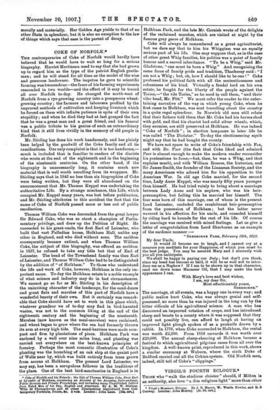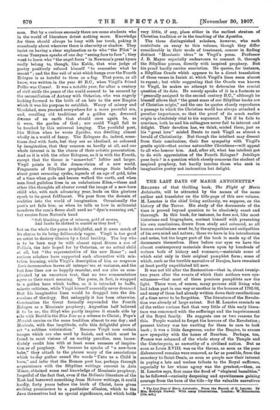VIRGIL'S FOURTH ECLOGUE.*
THOSE who "walk the studious cloister" should, if Milton is an authority, also love " a dim religious light" more than other • Virgil's Messianic Eclogue, By J. B. Mayor, W. Wards Fowler, and H. B Conway. London: John Murray. Les. 6d. net.]
men. But by a curious anomaly there are some students who in the world of literature detest nothing more. Knowledge for them should always be busy with her torch, poking it ceaselessly about wherever there is obscurity or shadow. They insist on having a clear explanation as to who "the Pilot" is whom Tennyson speaks of one day "seeing face to face "; they want to learn who "the angel faces" in Newman's great hymn really belong to, though, like Keble, that wise judge of poetry positively refused himself "to remember what he meant " ; and the fine veil of mist which hangs over the Fourth Eclogue is as hateful to them as a fog. That poem, as all know, was written in the year 40 B.C., when Virgil's friend Pollio was Consul. It was a notable year, for after a century of civil strife the peace of the world seemed to be secured by the reconciliation of Antony with Octavian, who was eagerly looking forward to the birth of an heir to the new Empire which it was his purpose to establish. Weary of misery and bloodshed, men yearned everywhere for a more peaceful era, and, recalling old traditions of a golden age, dreamed &tams of an earth that should once again be, as it were, the garden of God ; nor could Virgil fail to be touched by this universal longing. The youthful poet, like Milton when he wrote Lycidas, was dwelling almost wholly in a world of fancy. The Eclogues do, indeed, some- times deal with facts, but they are so idealised, so coloured by imagination, that they concern us hardly at all, and our whole interest is in the charm of their artistic presentation. And as it is with the other Eclogues, so it is with the Fourth, except that the theme is "somewhat" loftier and larger. Virgil paints in it the dream-vision of a new world. Fragments of Sibylline prophecies, strange Stoic beliefs about great recurring cycles, legends of an age of gold, tales of a time when gods and heroes walked the earth, and when men lived guileless lives in an unlaborious Eden,—these and other like thoughts all cluster round the image of a new-born child who, with each advancing year, leads on this glorious epoch to its great fulfilment. We pass from the domain of realities into the world of imagination. Occasionally the poet's art fails him, as when he tells us how in millennial meadows the ram's fleece shall need no " dyer's cozening art," but receive from Nature's hand " Soft blushing glow of crimson, gold of crocus, And lambs be clothed in scarlet as they feed" ; but on the whole the poem is delightful, and it owes much of its charm to its being deliberately vague. Virgil is too good an artist to destroy illusion by a fatal lucidity. The boy who is to be born may be with almost equal fitness a son of Porno's, the heir hoped for by Octavian, or no actual child at all, but " the representative of the new Rome " ; and curious scholars have supported each alternative with mis- taken learning, while Virgil's description of him as magnum 'orris incrementum leaves all interpreters at variance, and the last four lines are so happily oracular, and are also so com- plicated by an uncertain text, that no two commentators agree as their exact meaning. The poem, in fact, is wrapped in a golden haze which baffles, as it is intended to baffle, minute criticism, while Virgil himself assuredly never dreamed that his imaginative lines would be dragged into the dis- cussions of theology. But unhappily it has been otherwise. Constantine the Great formally expounded the Fourth Eclogue as a Messianic prophecy; Augustine half believed it to be so; the Sibyl who partly inspires it stands side by side with David in the Dies Irae as a witness to Christ ; Pope's ,Messiah carries on the same tradition almost to our day ; and Merivale, with fine ineptitude, calls this delightful piece of art "a sublime vaticination." Because Virgil uses certain images which are also used by Isaiah, and which must be found in most visions of an earthly paradise, men imme- diately credit him with at least some measure of inspira- tion or of prophecy. Or because he speaks of "a new-born babe," they attach to the phrase many of the associations which to-day gather round the words " Unto us a Child is born," and infer that the Roman poet has, perhaps through acquaintance with the Sibylline writings current in Asia Minor, obtained some real knowledge of Messianic prophecy, forgetful of the fact that, even if the Hellenic literature of the East had borrowed something from Hebrew writings, it could hardly, forty years before the birth of Christ, have given striking prominence to a particular allusion, which to the Jews themselves had no special significance, and which holds very little, if any, place either in the earliest stratum of Christian tradition or in the teaching of the Apostles.
The three distinguished scholars, however, who each contribute an essay to this volume, though they differ considerably in their mode of treatment, concur in finding distinct " Messianic ideas " in Virgil's poem. Professor J. B. Mayor especially endeavours to connect it, through the Sibylline poems, directly with inspired prophecy. But his proof hardly carries conviction. He quotes, for instance, a Sibylline Oracle which appears to be a direct translation of those verses in Isaiah xi. which Virgil's lines seem almost to repeat ; but while suggesting that the Oracle was known to Virgil, he makes no attempt to determine the crucial question of its date. He merely speaks of it in a footnote as "generally assigned to the second century B.C.," although he himself allows that "the great mass of our Sibylline books are of Christian origin," and the one he quotes closely reproduces a passage to which the Christian world has always attached a peculiar importance, so that the proof of its much earlier origin is absolutely vital to his argument. Yet if he fails to convince, both he and his colleagues never fail to interest and delight. Their devotion has, we think, misled them, just as his "great love" misled Dante to rank Virgil as almost a herald of Christianity. But though the intellect may dissent from their conclusions, their fine sympathy with Virgil's gentle spirit—that anima naturaliter Christiana—will appeal to all who honour him. And, after all, what has intellect got to do with appreciation of the Fourth Eclogue P Intellegis gums legis? is a question which closely concerns the student of inspired prophecy, but hardly touches those who seek in imaginative poetry not instruction but delight.



















































 Previous page
Previous page